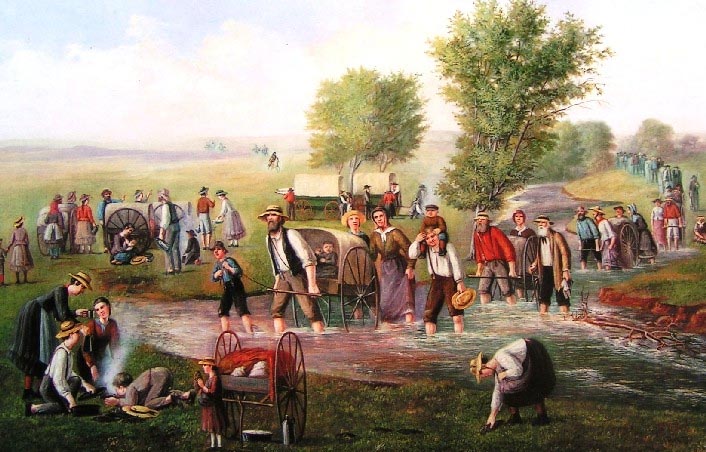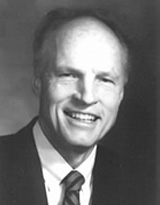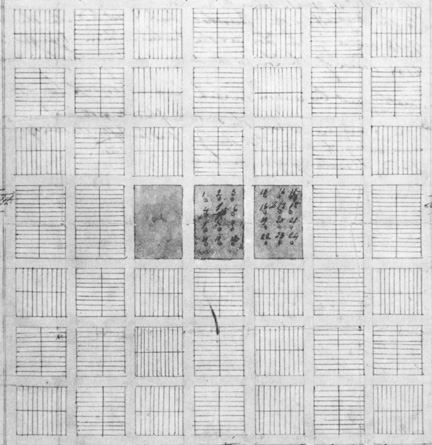Author: Nate Oman
-
Gender and Priesthood
I think that women should receive the priesthood. I don’t find the reasons that have been given as to why the priesthood is limited to males very compelling. I don’t think that motherhood is a good analog to priesthood, or rather I think that motherhood is a kind of priesthood (an exercise of godly power by human beings) but…
-
Seeing the Future of Mormonism
If you want to know where Mormonism going, look at Mormon missionary work. Mormonism is nothing if not a missionary church. Indeed, the evangelical imperative of the religion has consistently defined its teachings, theology, and culture. For example, if one is looking to read Mormon theology in the nineteenth century, you would find little in…
-
King Benjamin and the Moral Irrelevance of Panhandlers
For many people, being confronted by a panhandler presents a moment of profound moral choice. I think that these people are confused. As I understand it, the panhandler presents a moment of profound moral choice because he forces us to confront the reality of poverty and our willingness to do something about it. To give…
-
City Creek and the Choices of Thrift
Jana Riess, a person for whose intelligence and good will I have a great deal of respect, has an article up criticizing the new City Creek mall that that Church has financed in Salt Lake City. You ought to go read Jana’s article. To massively over simplify her point, the mall represents a basic moral…
-
How I should like to live my life…
I post here something I recently wrote in my journal: I basically think that Aristotle had it right on how to live a good life: find a proper mean between extremes, be balanced, and live virtuously. So here is what I would like my life to look like: I start with work, the labor I…
-
Huntsman, Mormonism, and the Presidency
For those who may be interested, I am going to be on KUER’s (the NPR affiliate in Salt Lake) Radio West program this afternoon discussing Mormonism and a possible presidential run by former Utah governor Jon Huntsman.
-
Why folks dislike Mormons
Flunking Sainthood has a nice post up on the recent finding in the book American Grace that Mormons are the third most disliked religious group in the United States. Jana makes some books points, and her call for a bit more Mormon humility is surely a good idea. Although the in-group identification that she cites…
-
A Call For Papers: “Mormonism in Cultural Context”
The friends and former students of Professor Richard Lyman Bushman invite submissions for a conference, on the occasion of his 80th birthday, to be held June 18, 2011, at the Springville Art Museum in Springville, Utah. The summer seminars led by Professor Bushman beginning in 1997 pursued the theme of “Joseph Smith and His Times.”…
-
Thoughts on the Deseret News, Immigration, and a Mormon Voice
Consider this editorial in the Deseret News. (I mean it. Follow the link, read the article, and come back.) Intellectually there is quite a bit going on in these paragraphs. First, it is addressing the immigration debate arguing in effect that the rule of law is undermined by both widespread flouting of the laws and…
-
Conference Announcement: “Embracing the Law: A Scholarly Conference on Doctrine & Covenants 42”
Embracing the Law A scholarly conference on Doctrine and Covenants 42 September 10, 2010 • Free Admission Session 1 9:00 – 10:45 a.m., Stonemetz Conference Room Jeremiah John, Southern Virginia University Law and Church in Section 42 of the Doctrine and Covenants Nate Oman, William and Mary Law School “I Give Unto You My Law”:…
-

The Dictation of the Holy Ghost to Us: A Pioneer Day Sermon
I spoke in church today. The youth in our stake just completed a four-day handcart pioneer re-enactment, and my remarks followed upon several youth speakers testimonies about their experience. Below is the text of my sermon:
-
Reforming the Church, Angst, and the Spirituality of Democratic Liberalism
t seems to me that what is at issue here is less one’s conduct than one’s emotional and intellectual stance. In other words, I suspect that there is relatively little in terms of conduct that would differ between folks here. We’re all interested in remaining faithful, contributing, serving, etc. I suspect that none of us…
-

How to write a revelation
I have been working on a paper looking at the Doctrine and Covenants, and my research has me thinking about how the texts of modern revelation were produced. I think that there are a lot of Mormons who assume that the words of the revelations in the Doctrine and Covenants were dictated word for word…
-
Waiting Outside the Temple
This story in the Arizona Republic got me thinking. It recounts the temple wedding of a Mormon convert. His mother opposed his baptism, and when it came time for him to be married she was devastated by her inability to attend the ceremony. The article was, I thought, a poignant telling of the story, one…
-
Polygamy, Natural Law, and Imperialism
I have been researching Reynolds v. United States (1879), the Supreme Court’s first polygamy case, on and off for several years. For those who are interested, my paper on the topic is now available for download at SSRN. Reynolds is an important case in American constitutional history, because was the first time the U.S. Supreme…
-
The Nasty Side of Christian Ethics
The language of turning the other cheek and Christian ethics in general can really get quite nasty.
-
Critical Theory for Thee but Not For Me
In 1996, the Catholic scholar Massimo Introvigne published an article entitled “The Book of Mormon Wars: A Non-Mormon Perspective.” He wrote:
-
The Evolution of Excommunication
I recently went through every version of the Church Handbook of Instructions, looking at what they have to say about the operation of church courts and how it has changed over time.
-
Political Sentiments and Religious Sentiments
My own politics ocillate between liberalism (in the grand historical sense) and conservatism.
-

Truman Madsen
Truman Madsen died earlier today. For those who don’t know, Madsen was a long-time professor of philosophy at BYU. His intellectual influence, I think, came in two forms. First, he produced a series of popular lectures on Joseph Smith and other gospel topics. These were not academically rigorous productions, but I think that they opened…
-
Prop 8’s Pyrrhic Victory
So Prop 8 has been upheld by the California Supreme Court, but it is largely Pyrrhic victory for Prop 8.
-
Sacred Space at BYU
Here is an updated schedule for BYU’s upcoming conference on Sacred Space on June 3rd. This looks a really great line up if you are in Provo.
-
“Jerusalem”
One of my favorite hymns is not in the hymn book. No, it’s not “Come Thou Fount of Every Blessing,” although that is one of my favorites as well. Rather, I am talking about the hymn “Jerusalem,” one of the great anthems of the Church of England when it gets low-churchy enough to sing hymns…
-
Mormons as Minorities
Today I gave a presentation to the William & Mary chapter of the J. Reuben Clark Society on “Mormons as Minorities” in which I discuss some of my research on Mormon legal and political history (and other stuff). If you are interested, you can listen to the presentation here.
-
What I Learned about Mormon Courts (and the Writing of Mormon History)
For those who are interested in Mormon legal history, my article “Preaching to the Court House and Judging in the Temple” was just published in the most recent issue of the BYU Law Review. (You can download a copy of the article here.) This article provides my own take on the rise and fall of…
-
The Double-Minded Essence of Mormonism
A while ago I was reading some sermons from the 1880s in the Journal of Discourses. The 1880s, of course, is the decade when the anti-polygamy crusades were at their most intense. Thousands of Mormons were incarcerated, the Brethren were in hiding from the law much of the time, and every time you turned around…

